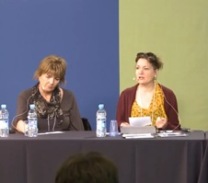
This article is from Blog Mastermind graduate Nicola Lees.
I am an accidental blogger. In 2008, just before the financial crash, I took voluntary redundancy from a major TV broadcaster after ten years during which I specialized in developing new non-fiction TV shows.
I entered the world of freelancing exhausted and anonymous with no contacts, no reputation and even less direction. I now have a name that is recognized internationally in the TV industry – admittedly it is TVMole and not my own – a website and newsletter with an international high-profile subscriber base of 2,500, and a twitter following of 3,600.
People constantly approach me to ask if I’ll work with them and some even even ask for my autograph. If you’d told me back then that to do all this but all I had to do was start a blog, I would have a) laughed and b) run away. Luckily, I had no idea what I was starting, otherwise I would have talked myself out of it, found reasons why it wouldn’t, couldn’t, be successful.
Benefit #1: Have A Platform To Sell My Books (And Courses Later)
 I started TVMole out of (what turned out to be unnecessary) necessity. After leaving my job I took some time out to retrain and spent six weeks in NYC practicing my editing skills on two feature films.
I started TVMole out of (what turned out to be unnecessary) necessity. After leaving my job I took some time out to retrain and spent six weeks in NYC practicing my editing skills on two feature films.
Whilst on the editing course, I also signed up for a Mediabistro Non-Fiction Book Writing course: my job had involved writing pitches of 300 words maximum, so I wanted to challenge myself to write more than page.
I started my assignment of 15,000 words and couldn’t stop. 70,000 words later (mostly written on the sofa in the editing suite as I waited for tutors) I had the draft of a book. It seemed worthwhile attempting to pitch the book to a publisher, but was advised that I wouldn’t be able to get an agent or a publisher without a ‘platform’.
I decided to set up a WordPress blog. It took me months, and many tears of frustration, to get it up and working properly. But it didn’t matter, because before I’d even bought my domain name I’d secured an agent (within 48 hours of sending out my proposal), and I got a publishing contract soon after.
I continued to wrestle with my blog out of sheer pigheadedness rather than any real desire to have a blog of my own. I stumbled across Yaro’s Blog Mastermind course and started working my way through it.
The lessons were invaluable and guided all the decisions I made, from whether to use my own name for the domain name or choose another that would serve as a brand (I chose TVMole), whether to set up a newsletter (yes, via AWeber) and deciding on the look of the blog (just choose something and start producing content and worry about the details of the aesthetics later – after a couple of false starts I went with a magazine theme called The Morning After, which I’m still very happy with).
Following Yaro’s advice I composed a series of ‘pillar posts’ before going live, and and then set a publishing schedule – a couple of short ‘news’ posts per day plus daily ‘inspiration’ posts (to help with the brainstorming of ideas) and a monthly longer ‘pillar’ post. 8000 posts later my schedule has been refined a little – I now only post my ‘news’ posts during the working week, have dropped the inspiration posts (I don’t have time), and I produce longer posts more infrequently, most usually after industry events such as festivals and conferences.
Benefit #2: Build A Global Reputation
Although my visitor and subscriber numbers are modest compared to many blogs (internet marketers would definitely sniff at these numbers), I’m happy. In fact, I spend a lot of time fending off suggestions from people (marketing people, spammers, my agent) who think I should be growing my numbers, but they miss the point.
My heart sinks when I see someone subscribing who doesn’t fit my demographic (actors, real estate agents, pastors), because I know that they aren’t going to ‘get’ my content and will no doubt unsubscribe in frustration when they find I’m not posting reviews of their favorite cop show or publishing detailed TV schedules.
These people probably don’t read past the name of the blog and assume it’s a fan site. But even this has an unexpected benefit: because I post early information about shows I often get the viewing public posting comments when these programmes eventually go to air. This offers a fascinating insight into which programmes are popular with the audience and why. Interestingly, industry people never leave comments; it seems we’re a shy lot in the world of TV.

My real audience is comprised of Development Producers, production company Creative Directors and MDs, and Commissioning Executives at major broadcasters and cable channels. The key function of TVMole is to publish information about shows that have been bought by broadcasters – extremely useful for developers who need to know what kind of shows are getting commissioned so they can leverage emerging trends and avoid pitching something that has just been greenlit.
I used to trawl all the trade press and press releases from broadcasters to find my content, but now I’m in the more fortunate position of having independent producers and press officers sending me information directly.
Benefit #3: Access To Case Studies
Over a couple of years TVMole grew in size (to approximately 15,000 visitors per month) and reputation. When I was commissioned to write a second book I turned to my subscribers to ask for interviewees and case studies and got volunteers from around the world:
- A wildlife producer in South Africa told me how he develops new wildlife shows
- A Scottish producer told me how he’d failed to capitalize on a show he’d made by not having an online profile
- A Canadian broadcast executive explained how he made a show with five different international partners
- A Belgian producer told me the story of how he set up an Olympic bobsled team for a TV series.
If it wasn’t for TVMole I would never have had access to any of those people, let alone their stories.
Benefit #4: Keep Track Of Industry Trends And Intelligence
My real audience niche, although global, is tiny; there are very few people who do my job, and many, many more who really don’t want to do my job.
The beauty of working in a Cinderella part of the industry is that those who toil away, researching, developing, writing and pitching new TV ideas and dealing with rejection after rejection (approximately 1 in 100 ideas pitched are actually commissioned), were extremely grateful when I started providing resources that makes their life a bit easier and validated what they do as skilled and valuable.
I’d like to say that I planned this to be the case, but really I was merely posting information that I would find useful. When I write articles for TVMole, or am deciding what content to include, I’m writing purely for me, because I am the target audience.
The reason why I have been able to sustain the blog for more than five years is that I regard it as my ‘industry brain’. Everything I could possibly need to know and/or remember about the world of factual TV development and commissioning over the past few years has been captured on TVMole, so I know where I can find it. I can’t not write it. The fact that other people find it useful is a bonus, but by no means necessary for its production.
Benefit #5: Word Of Mouth Marketing
 People definitely find TVMole useful; I know this because my newsletter subscribers increase week on week with no marketing of any kind on my part.
People definitely find TVMole useful; I know this because my newsletter subscribers increase week on week with no marketing of any kind on my part.
Referrals are all word of mouth, and happen mainly on a Monday after the newsletter drops into people’s in-boxes. Because I can track who signs up – or unsubscribes – I’m often the first to know when a new production company is launched, or when someone leaves their job or starts a new one, which is fantastic industry intelligence to have.
I decided to ignore all best practice to send the newsletter – which is a round-up of everything that has been published in the previous week – on a Monday morning. Internet marketers would say that mid-week is a better time to send a newsletter, but I envisaged people arriving at work on a Monday morning, coffee in hand and needing to ease into the week gently.
I thought if I were in their shoes I’d like to spend that time getting up to speed by scanning the headlines in my newsletter and feeling fully briefed on recent commissions, who’d been hired and fired, and new pitching/funding opportunities – all information that could be casually thrown into a meeting to impress their boss. I’ve since heard that my readers see it less as a gentle introduction to the week and more of a kick in the pants to get going. Either way, it seems to work.
Benefit #6: Raise The Profile Of Development As A Valid Career Choice
Next something strange started to happen. Instead of working in paranoid, competitive isolation we developers have started to develop a sense of solidarity.
A development producer in London approached me via TVMole to ask if he could set up a Development Producers Group (no reason to ask me, but that I was flattered that he did) and we met monthly for a couple of years before he moved home to New Zealand. During those sessions we had channel executives come and brief us, we got to know each other and partnerships were formed and referrals made.
In the last few years, development has become acknowledged as a specialist area, one that requires different skills and a particular mindset distinct from those required in production and for the first time ‘Developed by’ credits are appearing at the end of shows; traditionally we never got a credit; we really were the unsung heroes of TV production.
This raising of the profile of Development as a potential career option has attracted the attention of university media faculties and many have now added Development modules (based on my two books Greenlit and Give Me the Money and I’ll Shoot!) to their curriculum for the first time.
Benefit #7: Never Have To Look For Work Again
 As the profile of Development was raised, so my profile rose too, which brought more unexpected benefits.
As the profile of Development was raised, so my profile rose too, which brought more unexpected benefits.
About half way through the Blog Mastermind course I had to abandon it to concentrate on writing my book in order to meet my submission deadline. By then I was in a rhythm of posting regularly and I made sure to schedule this time in, but beyond this I didn’t do any active marketing and didn’t really expect anyone to read it – as I said, I was really doing it for my own benefit.
When I emerged from my book writing I was surprised to discover that my blog had taken on a life of its own, with a growing subscriber base of loyal readers.
I’d already decided not to actively monetize the site beyond using it as a place to promote my book when it was published. But what I hadn’t appreciated was how much money would come to me via offline methods as a direct result of having the blog. Something like 90% of my freelance income has come via jobs where people approached me because of my newly raised profile in a very niche area.
This has led to me getting a variety of interesting paid jobs:
- Running workshops in the UK, Europe and North America
- Producing 50 panels at a TV festival
- Running brainstorming workshops for small independent production companies
- Providing maternity cover at a creative agency
- One-to-one consulting for people outside the industry who have ideas they want to pitch
- Chairing a panel at BAFTA
- Mentoring people in the industry who want to get a job in Development
Benefit #8: Free Press Passes To Festivals
 Thanks to TVMole I’ve been able to get press passes to go to Cannes Film Festival, Edinburgh International TV Festival, Realscreen Summit in Washington DC, International Documentary Festival Amsterdam and Sheffield Doc/Fest.
Thanks to TVMole I’ve been able to get press passes to go to Cannes Film Festival, Edinburgh International TV Festival, Realscreen Summit in Washington DC, International Documentary Festival Amsterdam and Sheffield Doc/Fest.
I started by listing these festivals on the front page of my blog when they opened for registration or were running pitching competitions and re-tweeting their promotional material. This got me noticed, and made it easier to justify giving me a press pass when I was up against some really big trade publications. Now we have a really good reciprocal relationship whereby I post and tweet about the festivals and the festival teams will re-tweet my workshops and books – and as they have MUCH larger audiences than I do my reach is much greater than my blog analytics suggest.
Benefit #9: Build A Strong Platform To Launch New Projects
Last year I started thinking about other ways I could start to leverageTVMole and make some more money. My goal is to build several passive income streams so that at some not too distant point in the future I can cut back on my day-to-day work (which today consists mostly of running two film/TV industry talent development schemes) and concentrate on writing novels.
I looked back at my articles and one of the very first ‘pillar’ articles that I wrote – How to Write a Proposal That a TV Commissioner Will Actually Read – was by far the most popular post. I decided to run an online course that focused on this aspect of the development process.
I launched it via Skillshare (see my course here) in July 2013 and promoted it via TVMole and Twitter. Although it’s done well there are some limitations with the platform (because of issues around ideas theft I have to advise people not to post their assignments publicly, which means that I can’t see them and give them feedback either), so for my next course I’m looking at alternative options.
The good thing about doing the Skillshare course was that it forced me to get over my fear of recording videos of myself. The ones I managed to produce are not great, but they do the job and people don’t seem to mind about them being a bit rough around the edges.
Benefit #10: The Confidence To Keep On Learning
I’ve turned to Yaro’s Entrepreneur’s Journey as I feel like I’m at the same point as I was when I was launching TVMole – I have lots of ideas, and I know my niche really well, but could really do with some guidance on where to start regarding platforms and the technical delivery of the content, and I’m excited where it’s going to take me this time!
Nicola Lees
TVMole.com

